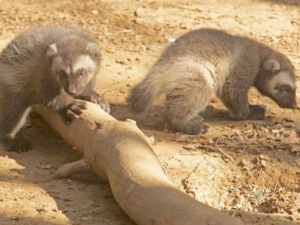Cotswold Wildlife Park unveils a very rare birth - the UK’s first ever Wolverine cubs

Cotswold Wildlife Park’s Wolverine, Sharapova, has given birth to the UK’s first ever cubs to be born in captivity.
The three new cubs, born to Sharapova and her mate Sarka, are a very rare sight and are the result of the Park’s European endangered species breeding programme (EEP). Just eighty Wolverines are believed to exist in captivity worldwide. So far this year, Cotswold Wildlife Park is the only collection in Europe to have successfully bred these rapacious predators. The new births are incredible news for the Park.
Sharapova gave birth to the trio at the end of January. The cubs are born blind, with a cream coloured pelage, which turns darker at the same time as the typical face mask develops. After spending around nine weeks in the den, keepers (and visitors) are seeing the rare cubs for the first time as they venture out and explore their new woodland enclosure. Wolverines feature prominently in many Finnish myths and legends, so the cubs have been given Finnish names: Ensin (meaning ‘first’, as they are the first to be born in this country, Nalka (meaning ‘hungry’, due to their voracious appetite) and Niemi (named after the Curator’s daughter).
Jamie Craig, Curator of Cotswold Wildlife Park and member of the EEP committee for Wolverines, said: “The Wolverines are a particular favourite at the Park and certainly do not deserve their fearsome reputation! Having said that, Sharapova is extremely protective of her cubs and keeps a close eye on the inquisitive male, Sarka. We are delighted to be the first UK collection to breed this species and the cubs will eventually move on to become important breeding animals in other European zoos.”
Wolverines (Gulo gulo) are the largest terrestrial mustelid. The elusive beast has a reputation for its power and ferocity and is also known as ‘The Glutton’ due to its rapacious appetite, consuming large quantities in one sitting. Wolverines posses one of the most powerful bites per square inch of any mammal.
Future survival of “The Glutton”
The plight of the Wolverine (Gulo gulo) was highlighted in "100 Animals to See Before They Die" (published by Brandt Books, 2007**). They are regarded as the 354th most endangered mammal according to the EDGE project (Evolutionarily Distinct and Globally Endangered). Although not globally threatened, population numbers are fast declining in their Northern European habitat due to conflict with reindeer farmers and habitat destruction. During the 19th century, Wolverines disappeared from southern Europe, mainly due to persecution. They were protected by law in 1969. Fortunately, they managed to survive in the most remote upland areas of Finland, Norway and Sweden.
Additional information:
- In North America, they are also known as the skunk bear or ‘Indian Devil’.
- Wolverines sport heavy, attractive fur that once made them a prime trapper’s target in North America.
- In the wild, wolverines inhabit arctic and sub-arctic areas of Russia, Canada, Mongolia, Scandinavia and parts of the United States.
Cotswold Wildlife Park opens its doors at 10am every day, with last admission at 4.30pm
Explore Gloucestershire
23 April 2012
For further information.
OTHER NEWS
